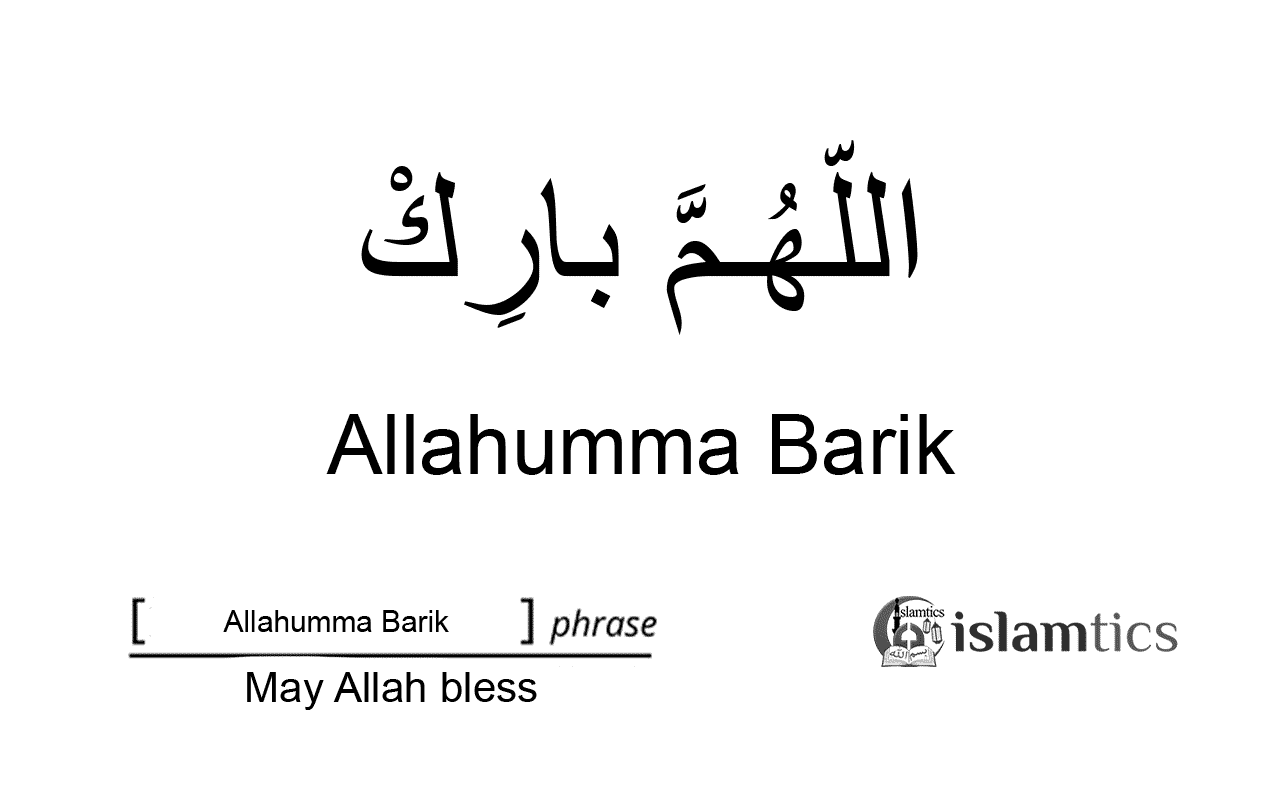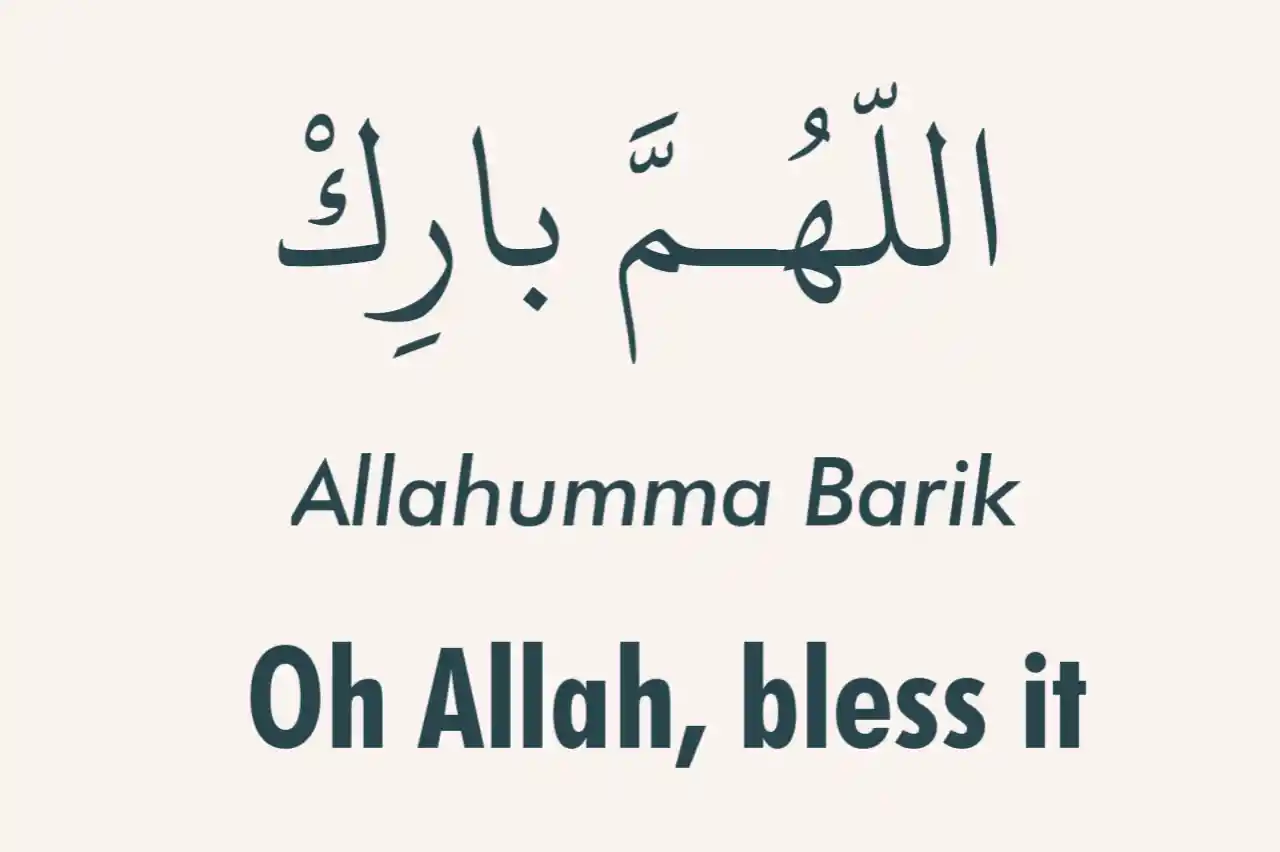What To Reply To "Allahuma Barik": A Comprehensive Guide For Everyday Muslims
Have you ever been in a situation where someone says "Allahuma Barik" and you're not quite sure how to respond? Don't worry, you're not alone! This phrase is deeply rooted in Islamic culture, but its meaning and appropriate replies can sometimes feel a little confusing, especially if you're new to the faith or haven't encountered it before. In this article, we’ll break it down for you so you can respond confidently and respectfully every time.
It’s important to understand the context and significance of "Allahuma Barik." This phrase is more than just a casual greeting or wish—it carries a spiritual weight and reflects the Islamic tradition of seeking blessings and gratitude. Knowing how to reply appropriately shows respect and understanding of the cultural and religious nuances involved.
So, let’s dive into what "Allahuma Barik" really means, its origins, and the best ways to respond in different situations. Whether you’re attending a religious gathering, visiting family, or simply engaging in casual conversation, this guide will help you navigate this phrase with ease and confidence. Keep reading, and you’ll be a pro in no time!
Understanding the Meaning of "Allahuma Barik"
Before we talk about how to reply, let’s first explore what "Allahuma Barik" actually means. This phrase translates to "O Allah, bless" or "May Allah bless." It’s often used as a form of blessing or gratitude, usually after someone has done something good or noteworthy. For example, if someone cooks a delicious meal or gives a meaningful speech, you might say "Allahuma Barik" to express your appreciation and ask Allah to bless them.
Origins of the Phrase
The phrase "Allahuma Barik" has its roots in Islamic teachings. It reflects the importance of seeking blessings from Allah in all aspects of life. In Islamic culture, expressing gratitude and asking for blessings is a common practice, and this phrase is just one way of doing so. It’s a reminder that every good thing comes from Allah, and we should acknowledge His role in our lives.
Common Contexts for Using "Allahuma Barik"
Here are some common situations where you might hear "Allahuma Barik":
- After someone performs an act of kindness or generosity.
- During religious gatherings or events.
- When someone achieves something significant, like graduating or getting a new job.
- In casual conversations to express appreciation or admiration.
Understanding these contexts will help you recognize when it’s appropriate to say or respond to "Allahuma Barik."
How to Reply to "Allahuma Barik"
Now that we know what "Allahuma Barik" means, let’s talk about how to respond. The good news is that there are several acceptable replies, and the choice often depends on the situation and your personal preference. Here are some common responses:
1. "Ameen"
This is one of the simplest and most widely used replies. "Ameen" means "amen" and is a way of agreeing with the blessing and asking Allah to accept it. It’s a short, respectful response that works in most situations.
2. "Jazak Allahu Khairan"
This reply translates to "May Allah reward you with goodness." It’s a way of reciprocating the blessing and showing gratitude. This response is particularly appropriate when someone says "Allahuma Barik" to you.
3. "Wa Alaikum Barik Allah"
This means "And may Allah bless you too." It’s a polite and reciprocal response that acknowledges the blessing and extends it back to the person who said it.
These are just a few examples, but there are many other ways to respond depending on the context and your personal style. The key is to choose a response that feels natural and respectful.
Common Mistakes to Avoid When Replying
While there’s no one "right" way to reply to "Allahuma Barik," there are a few mistakes you’ll want to avoid:
- Ignoring the phrase: Failing to respond can come across as disrespectful or ungrateful.
- Using inappropriate language: Make sure your reply is appropriate for the context and aligns with Islamic values.
- Overcomplicating the response: Sometimes, a simple "Ameen" is all you need. Don’t feel like you have to give a long, elaborate reply.
By being mindful of these common pitfalls, you can ensure that your response is respectful and culturally appropriate.
Understanding the Cultural Significance of "Allahuma Barik"
It’s important to recognize that "Allahuma Barik" is more than just a phrase—it’s a reflection of Islamic culture and values. In many Muslim communities, expressing gratitude and seeking blessings is a daily practice. This phrase serves as a reminder of the importance of acknowledging Allah’s role in our lives and showing appreciation for the good things we experience.
How It Reflects Islamic Values
Islam places a strong emphasis on gratitude, humility, and community. "Allahuma Barik" embodies these values by encouraging people to recognize and celebrate the blessings in their lives. It also fosters a sense of community and mutual respect, as people exchange blessings and good wishes with one another.
How to Incorporate It into Your Daily Life
If you’re looking to incorporate "Allahuma Barik" into your daily life, here are a few tips:
- Use it to express gratitude when someone does something kind for you.
- Include it in your prayers or supplications as a way of asking Allah for blessings.
- Share it with friends and family as a way of spreading positivity and good vibes.
By making "Allahuma Barik" a part of your daily routine, you’ll not only be practicing an important aspect of Islamic culture but also enriching your spiritual life.
Practical Tips for Responding to "Allahuma Barik"
Now that we’ve covered the basics, let’s talk about some practical tips for responding to "Allahuma Barik" in different situations:
1. In Religious Settings
In religious gatherings or events, it’s common to hear "Allahuma Barik" after someone gives a speech or leads a prayer. In these situations, a simple "Ameen" or "Jazak Allahu Khairan" is usually sufficient. It’s important to respond promptly and respectfully, as this shows your engagement and participation in the event.
2. In Casual Conversations
When someone says "Allahuma Barik" in a casual conversation, you can choose a more relaxed response. For example, you might say "Ameen" followed by a friendly comment or compliment. This keeps the conversation light and engaging while still acknowledging the blessing.
3. In Formal Settings
In formal settings, such as business meetings or professional gatherings, it’s important to respond in a way that reflects the seriousness of the occasion. A polite and respectful reply, such as "Jazak Allahu Khairan," is usually appropriate in these situations.
Exploring Long-Tail Keywords Related to "Allahuma Barik"
While "Allahuma Barik" is the primary keyword for this article, there are several long-tail keywords that can help you better understand the phrase and its context:
- What does "Allahuma Barik" mean in English?
- How to respond to "Allahuma Barik" in Islam?
- Islamic phrases for gratitude and blessings.
- Cultural significance of "Allahuma Barik" in Muslim communities.
These keywords provide additional insights into the topic and can help you explore related concepts and practices.
Referencing Trusted Sources
To ensure the accuracy and reliability of the information in this article, we’ve consulted several trusted sources:
- IslamQA: A comprehensive resource for Islamic teachings and practices.
- OnIslam: A platform for learning about Islam and its cultural practices.
- Al-Islam: A website dedicated to promoting Islamic knowledge and understanding.
These sources provide valuable insights into the meaning and significance of "Allahuma Barik" and offer guidance on how to respond appropriately.
Conclusion: Mastering the Art of Responding to "Allahuma Barik"
In conclusion, knowing how to reply to "Allahuma Barik" is an important skill for anyone engaging with Islamic culture or practicing the faith. Whether you choose to respond with "Ameen," "Jazak Allahu Khairan," or another appropriate phrase, the key is to do so respectfully and with an understanding of the phrase’s significance.
We encourage you to practice using "Allahuma Barik" in your daily life and to share this article with others who might benefit from it. By doing so, you’ll not only be enriching your own spiritual journey but also contributing to a greater understanding and appreciation of Islamic culture.
So, what are you waiting for? Start practicing your replies today and become a pro at responding to "Allahuma Barik" in no time!
Table of Contents
- Understanding the Meaning of "Allahuma Barik"
- How to Reply to "Allahuma Barik"
- Common Mistakes to Avoid When Replying
- Understanding the Cultural Significance of "Allahuma Barik"
- Practical Tips for Responding to "Allahuma Barik"
- Exploring Long-Tail Keywords Related to "Allahuma Barik"
- Referencing Trusted Sources
- Conclusion: Mastering the Art of Responding to "Allahuma Barik"

Allahumma Barik

Allahumma Barik

2 Allahumma Barik Stock Vectors and Vector Art Shutterstock